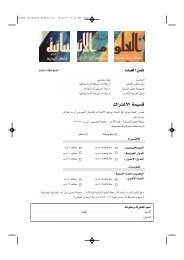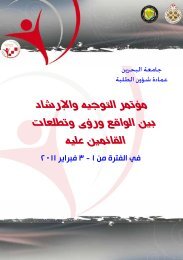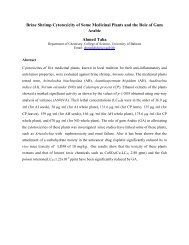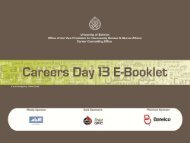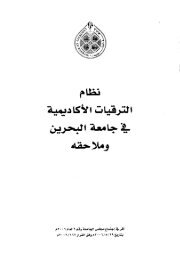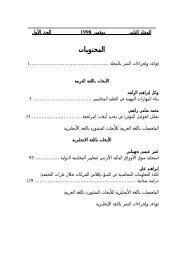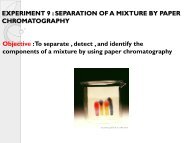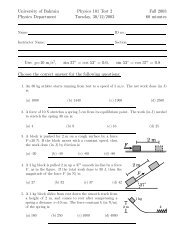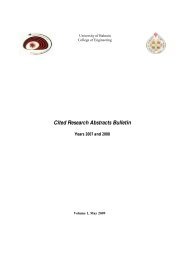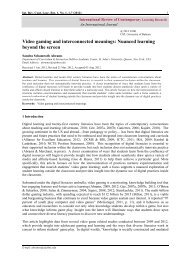د. ÙÙا بÙت عÙ٠اÙÙعÙ٠٠د. ÙÙÙÙÙÙÙÙادر ÙاظÙÙÙÙÙÙÙÙ٠د. ج٠ا٠... - جا٠عة اÙبØرÙÙ
د. ÙÙا بÙت عÙ٠اÙÙعÙ٠٠د. ÙÙÙÙÙÙÙÙادر ÙاظÙÙÙÙÙÙÙÙ٠د. ج٠ا٠... - جا٠عة اÙبØرÙÙ
د. ÙÙا بÙت عÙ٠اÙÙعÙ٠٠د. ÙÙÙÙÙÙÙÙادر ÙاظÙÙÙÙÙÙÙÙ٠د. ج٠ا٠... - جا٠عة اÙبØرÙÙ
Create successful ePaper yourself
Turn your PDF publications into a flip-book with our unique Google optimized e-Paper software.
197<br />
2 0 1 1<br />
مقاربات<br />
it makes visible what the ‘official’ state of the<br />
situation, that is its Being, represses.<br />
The subject then emerges after the Event and<br />
is completely defined by its fidelity to the<br />
event. The subject retroactively gives birth<br />
to the event by interpreting it as event. The<br />
interpretation becomes part of the event.<br />
The new truth starts from fixing the current<br />
situation, but is only achieved when it succeeds<br />
to evade it.<br />
To Badiou, philosophy takes place under<br />
four conditions: Art, Love, Politics, and<br />
Science. Badiou called these condition ‘truth<br />
procedures’, in the sense that they can, under<br />
the right conditions, produce truths.<br />
An important proposition in Badiou’s thought<br />
was the contingent nature of the truth event,<br />
and thus the contingency of truth produced<br />
by a truth-procedure based on that event. The<br />
event is contingent because of the multiplicity<br />
of the situation in which ‘random’ events may<br />
or may not succeed in forming a rupture in<br />
the situation to enable the truth-procedure to<br />
work.<br />
Insufficient Profanity<br />
In Saint Paul: The Foundation of Universalism<br />
Badiou started by claiming, in the prologue to<br />
the book, his undisputed right to draw on Paul’s<br />
letters freely, without devotion or repulsion.<br />
He stressed his secular inclinations to his<br />
subject-matter and spoke of the resurrection of<br />
Christ as a fable. However, that apparently did<br />
not deter Christian scholars from positively<br />
receiving his work, which was probably a<br />
sign that he did not fundamentally contradict<br />
religious convictions in his reading of St Paul.<br />
A possible indication that Badiou’s work<br />
could be accommodated, at some level, within<br />
the religious circles was what Alain Gignac,<br />
the professor in the Faculty of Theology<br />
at the University of Montreal, reported as<br />
‘favourable’ reception of Badiou’s book in<br />
the part of exegetes. (Gignac 16) Gignac even<br />
attempted to lighten the impact of the word<br />
fable used by Badiou as a belittling of the<br />
verity of the Christian faith: “the word fable<br />
is more ambiguous than it may appear. On the<br />
one hand, it can be used to describe the effect<br />
of language where the ineffable attempts to<br />
express itself (...). On the other hand, the word<br />
can refer to the very meaning of the event<br />
(...): Is it not characteristic of the event to be<br />
‘fabulous’?” (Gignac 16)<br />
Badiou, however, assured us that what<br />
interested him in Paul was a ‘gesture’ that was<br />
“formally possible to disjoin from the fable”<br />
(5). The ‘fable’ was stripped out of its fabulous<br />
element by Badiou’s meticulous use of formal<br />
mathematical language in the course of his<br />
analysis. Paul’s gesture was the bridging of<br />
the ‘communitarian’ divide between Jews and<br />
Pagans by offering a proposition of a subject<br />
that transgressed the communitarian identities<br />
via the belief in an event “whose only ‘proof’<br />
lies precisely in its having been declared by a<br />
subject” (5). The ‘declaring subject’ was Paul<br />
himself, and the faith in the event has become<br />
a law without a supporting evidence; a truth.<br />
Paul has succeeded in subtracting the truth<br />
from what Badiou called “the communitarian<br />
grasp.” (5)<br />
Why Paul Now?<br />
Being convinced that Badiou’s exploitation of<br />
Paul was far from religious, the question that<br />
still remained, however, was: Why was the<br />
rethinking of Paul’s gesture a “contemporary<br />
necessity”? (6) Badiou tried to answer the<br />
question by making Paul work for his projects<br />
- 4 -



